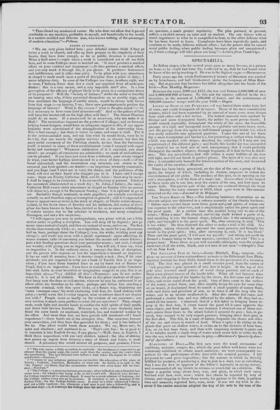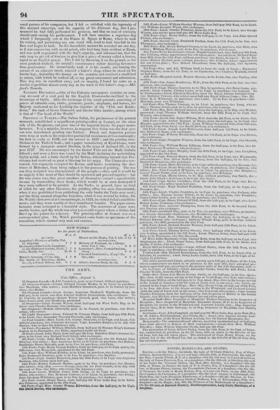SPECT.A.B ' •
An Italian singer, who for several years gave as many lessons, at a guinea an hour, as he could find time for, confessed to us, that he had learnt what he knew °idle art by teaching it. He was in the highest vogue.—llarmonicon.
Forty years ago the shole Parliamentary branch of literature was carried on by Scotchmen, and half Grub-street spoke the language of Allan Ramsay. But at present that business has fallen altogether into time hands of the Irish.—New Monthly Magazine.
Between the years 1800 and 1815, the war cost France 1,000,000 of men and 6,000,000,000 °tisanes. To this add the injuries suffered in the two invasions, to the amount of l,500,000 of francs, and the maintenauce of 200,000 enemies' troops until the year 1818.—Dupin.
LAVERS OF SNOW IN THE PYRENEES.—I was buried there under forty feet of snow, and could distinguish all its layers. Those of the most considm:rahle winters, which had been separated by an interval of many years, were distaut from each other only a few inches. The hottest summers were marked by thinner and more transparent bands, the milder by more porous bands. I could remark especially, throughout the whole of the mass, the insensible passage of a light and hexagonal snow, to a globular and more heavy snow, and the passage from tins again to half-formed opaque and brittle ice, n hien was easily reducible into spherical particles. Under this sort of ice there lay a more transparent and harder ice,.bat presenting a surface when broken, which was marked with stripes, denoting the soldering (if I may use the expression) of the different parts ; and finally this harder ice was succeeded by a band of ice so hard and of such transparency, that I could perfectly distinguish the smallest objects, through fragments of it four inches in thickness. This ice, nevertheless, had still within it many bubbles of air, was still light, and did not break in perfect planes. The layer of it was also very thin ; it extended only beneath the interior surface of the snow, and incrusted the vaults of the caverns.—Ramond.
There has been lately perceived, on the disc of the sun, a group of black spots, the largest of which, includingits shadow, surpasses in extent the circumference of our globe. The nucleus of this spot, on its opening on the sun's atmosphere, is of the form of a moan's hat. Seven others of the largest of these spots are in one line, near the centre of the sun, and floiguitit ttilipeolnargites upper limb. The greater part of the others are scattered thro ones. During the rainy summer of 1816, black spots were in like manner observed on the sun.—Journal de la Belgique.
TIIE THREE RACES OF MEN.—The following luminous dissertation on an obscure subject was delivered in a solemn assembly of the Oneida Sachems. " Before man existed there were three great and good spirits, of whom one was superior to the other two, and is emphatically called the great spirit and the good spirit. At a certain time this exalted being said to one of the others, Make a man.' He obeyed, and taking chalk formed a paste of it, and moulding it into the human shape, infused into it the animating principle, and brought it to the great spirit. He, after surveying it, said, This is too white.' He then directed the other to make a trial of his skill. Accordingly, taking charcoal, he pursued the same process, and brought the result to the great spirit ; who, after surveying it, said, It is too black.' Then said the great I will now try myself; ' and taking red earth he formed a human being in the same manner, surveyed it, and said ' This is a. proper man: These three, as you will naturally anticipate, were the originaf ancestors of all the white, black, and red men of our race."—Dwight's Trax..els in New York.
THE JACULATOR FISH OF JAVA.—James Mitchell, Esq., surgeon, who gives an account of these extraordinary animals in the Edinburgh New Philosophical Journal, for June 1828, found them in the pis:session of a Javanese chief. The first was placed in a small circular pond, from the centre of simich projected a pole upwards of two feet in height. At the top of this pole were inserted small pieces of wood sharp pointed, and on each or these were placed insects of the beetle tribe. When all had become tranquil after the placing of the beetles by the slaves, the fish came out of their holes, and swam round about the pond. One of them came to the surface of the water, rested there, and, after steadily fixing his eyes for some time on an insect, jt discharged front its mouth a small quantity of watery fluid., with such force and precision of aim, as to force it off the twig into the• water, and in an instant swallowed it. After this another fish came, and performed a similar feat, and was followed by the others, till they had secured all the insects. I observed, that if a fish failed in bringing down its prey at the first shot, it swam round the pond till it came opposite thua same object, and fired again. In one instance I observed one of these animals return three times to the attack before it secured its prey ; but, in general, they seemed to be very expert gunners, bringing down their prey at the first shot. This fish, in a state of nature, frequents the shores and sides of the sea and rivers in search of food. When it spies a fly sitting on the plants that grow on shallow water, it swims on to the distance of front four, live, or six feet from them, and then with surprising dexterity it ejects out of its tubular mouth a single drop of water which never fails to strike the fly into the sea, where it soon becomes its prey.—Blackwoods Quarterly Journal of ...lyriculture.
ANECDOTES OF Doos.—The first acts were the usual ceremonies of cotillions, minuets, cones, 8sc., which the poor fellow well knew were too commonly exhibited to obtain much audience ; we were consequently impatient for the performance of this duet with his musical partner. I felt prepared for some gross imposition ; but the manner in which he literally fulfilled his promise, of producing a dog to join in a duet, was so ridiculous, that I was the first to approve of the fellow's ingenuity in raising nwney, and reommended all may friends to witness so wonderful an exhibition. He began a popular song, about love, war, and glory, in which each verse finished with bow, wow, wow ; which last stanza he repeated by way of chorus, and stopping at these three words, his partner in the duet, in perfect time and measure, repeated bow, wow, wow. It was not my wish to discover if the canine musician adapted the key of his note to the tone of the vocal powers of his companion, but I felt so satisfied with the ingenuity of this maimed conscript, and the sagacity of his dilettanti dog, that 1 pronounced he had fully performed his promise, and that no man of curiosity should omit seeing his performance. I will here mention a sagacious dog which I frequently, saw at the Piazza de Spaga at Rome, where he took his station, and perceiving any one stand still, used to look him full in the face and begin to bark. In this formidable manner he accosted me one day, as I was conversing with an old priest, who had long been resident at Rome, and was well acquainted with the dog's sagacity, and informed me, that the only way to get rid of him:was to give him a piece of money called a biocco, equal to an English penny. This I did by throwing it on the ground, as the most prudent method, the animal's countenance rather denoting fierceness than good-nature. He immediately took it in his mouth, and turning the corner of an adjacent street, entered a baker's shop, where he stood on his binder legs, depositing the money on the counter, and received a small loaf in return, with which he walked off, to my great amusement and admiration. This dog was in excellent case; and on inquiry, I found he came on a similar expedition almost every day in the week to this baker's shop.—Mford's navels.
EASTERN DIGNITIES.—One of the Calcutta newspapers contains art amusing account of a visit paid by the English Commander-in-Chief to the Sovereign of Delhi. After the exchange of the usual presents, consisting of pieces of valuable coin, cloths, garments, jewels, elephants, and horses, his Majesty conferred on his Lordship the dignities of the "Fish and Kettledrum," the rank of Seven Thousand, and eleven titles besides, among which is that of" The Lord of the World."
PRINTING IN TUT/EVA—MR Sultan Selim, the predecessor of the present monarch established a magnificent printing-office at Scutari, on the other side of the Bosphorus, and gave two of the imperial kiosks for paper manufactories. It is a mistake, however, to suppose that Selim was the first person who introduced printing into Turkey. Greek and Armenian presses were long at work in the respective patriarchal residences at Constantinople; the first so early as 1530, and the second in 1697 ; and the printing establishment for Turkish books, and a paper manufactory at Kyat-khana, were formed by a renegado named Ibrahim, in the reign of Achmed HI., in the year 1727. Ile was encouraged by the Grand Vizir and the Mufti Abdulla Eflianti ; and even a fetva was issued by the Mufti declaring the undertaking highly useful, and a hatta shevill' by the Sultan, felicitating himself that Providence had reserved so great a blessing for his reign. The Ulema also concurred, but expressly excepted the Koran, and books containing the doctrines of Mahomet, from being subject to the process of printing. Tim reason they assigned was characteristic of the people ;—they said it would be an impiety if the word of God should be squeezed and pressed together : but the true cause was, that great numbers of themselves earned a considerable income by transcribing those books, which would be at once destroyed if they were suffered to be printed. As the Turks, in general, have no kind of relish for any other literature, the printing office was soon discontinued, when it was prohibited from publishing the only books the Turks ever read ; and the thing seemed altogether forgotten, when it was revived by Mint. On Dr. Walsh's first arrival at Constantinople, in 1821, he visited Sclim's establishments, and they were worthy of their munificent founder. The paper manufactories were arranged in a beautiful style. The reservoirs of water were marble basins, and the whole was what you would expect where a Sultan had fitted up his palace for a factory. The printing-office at Scutari was on a correspondent plan. Dr. Walsh purchased some books as specimens of the execution, which seemed very neat and correct.



















 Previous page
Previous page